- Home
- Warhammer 40K
Shadow Captain - David Annandale Page 6
Shadow Captain - David Annandale Read online
Page 6
Laughing.
The bolter shells left the canopy untouched. One second too late, Caeligus realised that they weren’t even hitting it. There was a strange shimmer about the train. The shells were striking a force field. Then every gun on the train fired simultaneously. A curtain of projectiles cut through the squad. The bullet streams were unending. They defeated ceramite, battered and bled the Space Marines into bloody meat. The cannon fired again. All the cannons did. The train was surrounded by a storm of blasts.
The fire faded. So did Caeligus’s retinal display. Havren was the last of his brothers to die. Caeligus saw him topple from the roof of the locomotive, both arms and his left leg shot away. Caeligus clung to the lower fangs of the engine’s battering ram. There were large holes in his power armour. His jump pack was leaking promethium. If he tried to use it, he would immolate himself. Though he had lost his display, he knew he was suffering from massive internal bleeding.
He would rip the laughter from that ork’s throat.
Strength fading, he tightened his grip on the iron fang and hauled himself upwards. He grabbed the upper teeth, found a foothold on the lower ones. Above that, there was a smooth expanse of metal. He paused, looking for any means to climb higher.
The jaws parted.
He lost his grip and fell forward. His chest hit the mouth of a stubby cannon almost as wide as the one on the rear car. He threw himself backwards as the gun roared.
The shell did not hit him directly. So he lived long enough to know what was happening to him. The damage was so great that it was beyond pain. His body was enveloped by a cold nothing. He flew in a broken cartwheel and landed a short distance ahead of the locomotive. He tried to rise. His body did not respond. He couldn’t even blink. He lay on his back, his head twisted to the side. In the burning dawn, he watched the train rush towards him. Its shadow passed over him, returning him to night. Then came the treads.
And then, at the very end, there was room for more pain.
Behrasi heard Caeligus’s final vox transmission. Then, as if summoned by the dawn, the rest of the ork army appeared over the north horizon. A few moments before, there had been silence. The cacophony of engines and war cries did not approach: it erupted.
‘How did we not hear them before?’ Brother Rhamm asked.
Squad Behrasi was on one of the few roads of Lepidus. It circled the hill of Reclamation in a wide ellipse, about five kilometres from its base to the north and south, twice that east and west. On the east side, it embraced most of the colony’s cultivated land. The Raven Guard were midway between the point where the road turned south, and the branch that led to the city’s east side. The terrain consisted of gentle hills. Further to the east was a web of deep gullies. The road was the easiest, most likely route for the orks to take. The surprise had been in the enemy’s absence until now.
‘They were waiting for the signal,’ Behrasi said. The strategy was simple, it was effective, and it was another lesson in the danger of underestimating the orks. ‘The army and the land train will reach Reclamation at the same time.’
Krevaan’s voice came over the vox. He was speaking to the entire company, demanding news of Caeligus. Behrasi said, ‘We’ve lost all contact. I have eyes on the ork army.’
‘All forces converge on Squad Behrasi’s location,’ Krevaan ordered. After a moment, he added, ‘I will send you word about the eldar disposition shortly.’
‘Will they be joining us?’
‘It would be in their best interests to do so.’ The comment could be taken a number of ways. Behrasi assumed that Krevaan meant them all.
He watched the rising clouds of dust and smoke that marked the ork approach. ‘The greenskins will be here before reinforcements arrive,’ he said.
‘Slow them down,’ Krevaan said. ‘We must keep the two forces apart. Together, they will raze everything. We have a chance of defeating the separated foes.’
‘Well,’ Behrasi said to his battle-brothers when the Shadow Captain had signed off, ‘shall we demonstrate how a single squad can stop an army in its tracks?’
A few hundred metres further on, the road passed between two rises. It was as close to a choke point as they would find.
‘This is where we stop them,’ Behrasi said.
‘Will we?’ Rhamm asked.
‘I didn’t say permanently. But long enough.’
Half the squad began laying mines. Behrasi took the other half forward. The single ambush would not be enough. Every impediment they could throw in the orks’ way would make a difference. Each moment that the orks had to struggle to advance was a moment that brought the rest of Eighth Company closer to the engagement and interfered with the timing of the orks’ assault.
The Raven Guard advanced on foot, at a run. They eschewed the use of the jump packs. They needed invisibility more than speed. Behrasi and Rhamm pounded along the west side of the road while the other three took the east. They would have time, Behrasi estimated, to cover perhaps a kilometre before they met the leading elements of the orks. That would be enough.
Going north, the hills became even lower. They were gradual swells giving way to prairie. There were no trees. The grass was less than calf-height. Day had come, and the sky was overcast. If Behrasi looked away from the approaching horde, if he blocked out the sound of savagery and war, he saw a mirage of peace. Other than Reclamation and its immediate surroundings, Lepidus was untouched. The roads, like the bridge, pre-existed human colonisation. They were almost completely unused by the colonists. The millennia had eroded them, just as they had toppled the city that had once stood in Reclamation’s place. Though the edges were ragged with creeping growth, and there were cleavages where the ground had shifted in important ways, for the most part the pavement ran straight and smooth. Behrasi did not recognise the materials of the road’s construction, though he now had a very good guess as to their origin. Other than the roads and the city, the planet was a blank slate, a garden that tended to itself, waiting to be of use.
Lepidus was, he knew, beautiful. He did not feel it to be beautiful. He experienced it as an arena of war. The peace of the landscape would vanish, ground to muck by the machines of slaughter. And this bucolic gentleness was an irritant in its lack of cover.
An irritant, not an enemy. The land was open, and the light was bright. There were still shadows. Wherever the foe was not omniscient, the wraith-slip was possible. And the orks were far from omniscient.
Now the enemy was less than a kilometre away. The Raven Guard kept moving forward, but at a diagonal away from the road. The orks were in full flight. They were charging straight ahead, hungry for their appointment with battle. They were not interested in what was happening on the sides, in movements that were visible only in the corners of their eyes.
One by one, the warriors of Squad Behrasi went to ground. At staggered intervals, the Space Marines lay prone, shadows in the grass, bolter sights set on the road. Behrasi was the closest to the enemy. He took up his position with barely a hundred metres to go before the greenskins arrived.
The warbikes came first. Their drivers leaned forward in their seats, jaws wide as they drank in the exhilaration of speed. They snarled at each other as they raced to be the first to arrive at the celebration of violence. They were within arm’s reach of each other. Behrasi opened fire.
He blew the head off the leading ork. Its bike turned into the path of others as it tumbled down the road, spreading metal and flame. The next ork in line turned too hard and lost control. The bike flipped, catapulting the driver with such force that the brute left a metres-long spread of skin and blood when it hit the pavement. As at the gorge, a chain reaction built up. Laughter at the misfortune of rivals turned into screams as the bikes piled into each other. A burning mass of jagged metal screeched along the pavement and stopped.
Behind it, drivers of other warbikes managed to slow down enough t
o veer off the road. There was no cliff to finish them off here. Some rode past the flames and then were back on the road, roaring back to full speed. But others hit the wrong bit of unevenness of terrain. At those speeds, that was enough to send more bikes to the ground, their drivers catapulted into the air. Some of the orks survived their falls.
The army’s advance began to stumble.
No orks had survived the massacre at the gorge. The rest of the army had not known there was a lesson to learn. With grim amusement, Behrasi watched history repeat itself for the first minute of the ambush. But the terrain was wider here, the orks had room to manoeuvre, and the force was so much larger. It was too big to be stopped.
The rest of the bikes found their way around the obstacle. So did the buggies. The battlewagons came up the middle and drove straight through the wreckage, scattering it to either side. The infantry followed.
To the south, more bikes went down. And then Rhamm took out the driver of one of the buggies. It slewed violently. Instead of trying to regain control, its gunner opened fire. Bullets raked across more of its kin than the landscape. A tank disciplined the gunner by putting a shell into the buggy before the vehicle could crash. More drivers died, more vehicles collided with each other, and the tangle grew worse.
Less than a minute had elapsed.
Behrasi rose from his position and headed south. He ran parallel with the orks. They paid even less attention to the sides. All eyes were on the fire and riot ahead. The horde slowed again, bunched up, and spread out. The orks were close to overrunning the Raven Guard positions without even knowing it. Behrasi pulled further back. He wanted a few more strategic kills before he was dragged into the mire of the fight for survival.
He was level with one of the tanks. It had a double turret, a smaller cannon placed above a larger one, each rotating independently. Its gunners were riding in the open. The hatches were open. The target was ideal. The opportunity was there.
He looked ahead. The wreckage was being cleared again. There was only a few hundred metres before the orks reached the choke point.
‘Brother Gheara, wait for the first tank. The rest of you, join the attack when it begins. Use of jump packs authorised.’ He looked back at his battlewagon. Now, he thought, you have my full attention.
Still running, he shot the gunners. As the orks behind the tank turned in his direction, he used his jump pack to propel himself at the vehicle. He landed on the top turret. An ork popped out of its hatch. He impaled its throat with his lightning claws, and hauled the gurgling greenskin out with one arm. He tossed the ork over the side. It was trampled by its fellows. Behrasi dropped frag and krak grenades down the hatch. Then he shot away from the battlewagon on full burst from the pack.
Below, the tank halted after the first muffled explosion. Both cannons aimed his way. Smoke was billowing from the hatches, but the greenskins were still determined to fire. The guns boomed. The shells shrieked past Behrasi at the same moment as the battlewagon blew up.
He came down at the choke point. The mines had torn the treads out from the leading tank. The orks were still trying to drive it. It lurched forward in jerks, spraying sparks as its metal wheels dug at the pavement. Two other buggies were upended and burning. Infantry was pouring into the space between the hills. Gheara and Paazur were on the battlewagon, fighting a dozen orks on the roof. Behrasi fired at the orks climbing up the sides of the tank. So did the other four members of the squad as they arrived. They bought Paazur enough time to haul open the hatch. He turned, aimed his flamer down and incinerated the interior.
The battlewagon stopped moving, a hulk of dead iron in the middle of the road.
Squad Behrasi kept shooting, piling up the bodies. The orks kept coming, faster and stronger. Gheara was in the clear, but before Paazur could leap from the tank, two massive orks surged from the crowd, faster and with more agility than should have been possible with their armour. They attacked Paazur from both sides, one with a chainaxe, the other with a power claw. The blows were the crack of thunder.
Paazur fell to his knees. One ork jammed the chainaxe into his gorget, grinding through until Paazur’s head hung down his left shoulder. The other greenskin, unwilling to be left out of the kill, slammed its claw against his back. Its aim was off and it burst the flamer tanks. Howling, coated in liquid fire, the orks jumped from the battlewagon, spreading flame in the horde below.
The tide rose up both sides of the choke point. Two more tanks were coming up behind. The Raven Guard had created a dam, but Behrasi knew it was about to burst. How long had they held the orks back?
The battle had lasted a few minutes. It was almost over.
The squad regrouped. The Space Marines formed a line across the road. They walked backwards, away from the wreck of the battlewagon, and poured bolter shells into the horde. They killed orks by the score. Orks by the hundreds replaced them. The retaliatory fire became more organised, more concentrated, more lethal.
‘Brothers,’ Behrasi voxed to the company, ‘I hope you are close. We have held the enemy back for as long as we can.’
‘We are almost with you,’ Sergeant Klijuun responded.
‘I see them,’ Gheara said.
Behrasi risked a glance backwards. He saw the streaks of seven more assault squads closing in.
In the same moment that he saw the hope of reinforcements, he heard the train. Heavy, thudding, sending the vibrations of its might spreading through the ground for thousands of metres in all directions, the orkish madness for speed and strength given material form appeared in the east.
Too soon, Behrasi thought. Too fast.
The train’s horn blasted across the land. Violence itself had a voice, and it rejoiced.
CHAPTER FIVE
The autarch and Alathannas arrived in the field just outside the Raven Guard encampment within minutes of Krevaan’s return. The two eldar rode their jetbikes to within a few metres of where the Thunderhawk Claw of Deliverance was preparing for lift-off. Krevaan was aboard with his squad. He ordered the pilot, Radost, to wait. He pulled open the side door, jumped to the ground, and strode over to the two xenos.
‘You know of the land train,’ Alathannas said.
‘It destroyed ten of my warriors.’
‘And many of ours. Autarch Eleira believes our strategies should be closely coordinated. We cannot confront the orks in a direct contest.’
Admitting the orks’ numerical and armour superiority to anyone other than his battle-brothers went against Krevaan’s every instinct of honour and pride. Denying the truth of the assessment, however, would be madness. There was no time for grandstanding. And he had never had patience for commanders unwilling to face reality. ‘I agree,’ he said, looking directly at Eleira.
She acknowledged him with a formal nod.
Alathannas began, ‘If the land train joins the main army…’
‘We are aware of the danger,’ Krevaan interrupted. ‘We are fighting to keep them apart.’
Eleira said something to the ranger. Alathannas translated, ‘With respect, force may not be sufficient.’
That, too, was true. ‘What alternative do you propose?’
‘We must make the orks choose to take separate paths.’
‘I approve of the goal. You would need to offer them something very tempting for that to work.’
‘The autarch proposes that we offer ourselves. All the eldar on this planet will ride before the army, drawing it off before the land train arrives.’
Krevaan was impressed by the daring and the selflessness of the move. The sacrifice the eldar were willing to offer was great.
It was one that would make no sense if there wasn’t something more important to the eldar than any of their lives on this planet. In the city.
For Krevaan, the conversation took on the aspect of a duel. He and the eldar were using verbal camouflage as they sough
t to outflank each other. Every word spoken was true, and every word spoken was beside the point. The eldar needed the orks destroyed so they could find their true target. Krevaan had come to rid the planet of the orks, but to the larger game of luring the Overfiend to the system was added the necessity of uncovering the eldar game.
‘Your plan does you great honour,’ Krevaan said. And he too, was speaking the truth, even while he thought how profoundly he distrusted the eldar motives for undertaking this action. ‘Should you succeed, have you considered how to survive that pursuit?’
‘Speed has always been our weapon. If the orks look to our annihilation, rather than to besiege the city, we will have greater scope for action,’ Alathannas said.
Krevaan visualised the territory. ‘There are gullies to the east,’ he said. ‘If they follow you there, their mobility will be compromised.’
Alathannas translated for the autarch. She inclined her head again. The ranger said, ‘We thank you for the information. You will mount an assault on the train?’
‘Yes. It will not reach the city.’
‘Then we wish you victory.’
The sentiment sounded heartfelt. It was difficult to read what move in the duel it concealed. Krevaan wondered if the ranger had his leader’s full confidence. Having him speak made Eleira’s strategy even harder to divine, especially if Alathannas believed what he was saying. Yet the autarch was not wearing her helmet. She was looking at Krevaan with a clear gaze, and an expression that spoke of the respect of one veteran warrior for another. She spoke now, her Gothic laboured but correct. ‘Your alliance is an honour,’ she said.
‘As is yours,’ Krevaan said. He had expected to grind his teeth. Instead, the words came easily. They were true without qualification, without subterfuge. The skill of the Saim-Hann was ferocious. Krevaan knew this from having fought them in the past. As formidable as these xenos warriors were, they were as badly overmatched as they had been the night before. The orks were stronger, more numerous and better equipped than either eldar or Space Marines had expected. What Eleira planned verged on martyrdom.

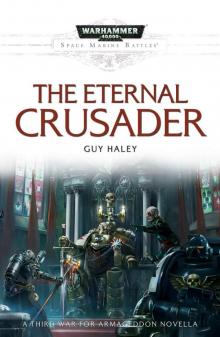 The Eternal Crusader - Guy Haley
The Eternal Crusader - Guy Haley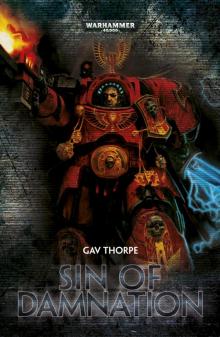 Sin of Damnation - Gav Thorpe
Sin of Damnation - Gav Thorpe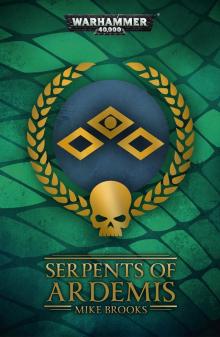 Serpents of Ardemis - Mike Brooks
Serpents of Ardemis - Mike Brooks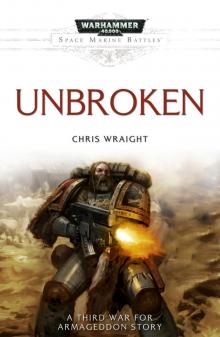 Unbroken - Chris Wraight
Unbroken - Chris Wraight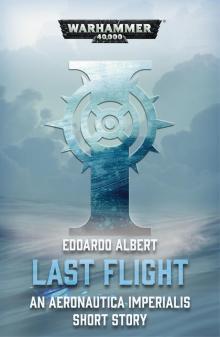 Last Flight - Edoardo Albert
Last Flight - Edoardo Albert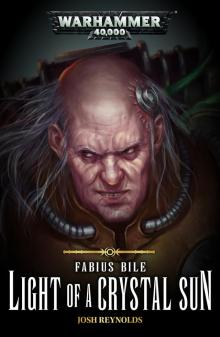 Light of a Crystal Sun - Josh Reynolds
Light of a Crystal Sun - Josh Reynolds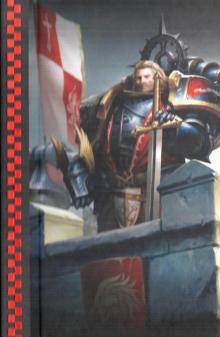 Lion El'Jonson- Lord of the First - David Guymer
Lion El'Jonson- Lord of the First - David Guymer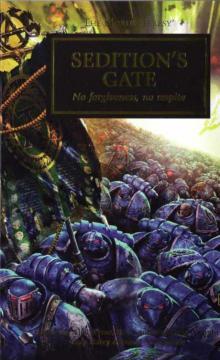 Sedition's Gate - Nick Kyme & Chris Wraight
Sedition's Gate - Nick Kyme & Chris Wraight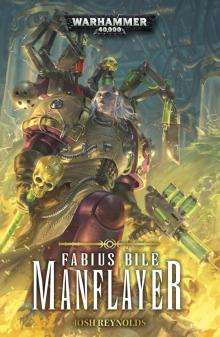 Manflayer - Josh Reynolds
Manflayer - Josh Reynolds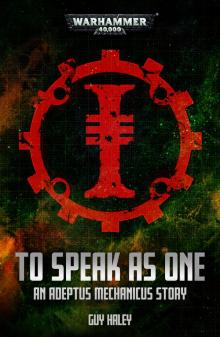 To Speak as One - Guy Haley
To Speak as One - Guy Haley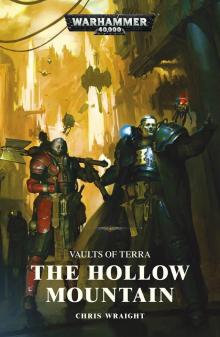 Vaults of Terra- The Hollow Mountain - Chris Wraight
Vaults of Terra- The Hollow Mountain - Chris Wraight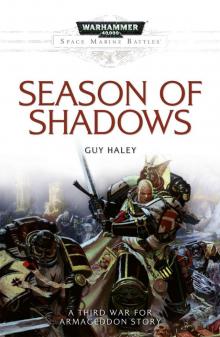 Season of Shadows - Guy Haley
Season of Shadows - Guy Haley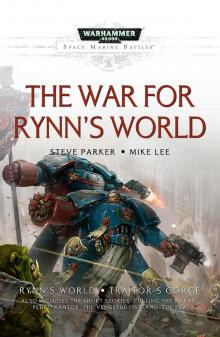 The War for Rynn's World - Steve Parker & Mike Lee
The War for Rynn's World - Steve Parker & Mike Lee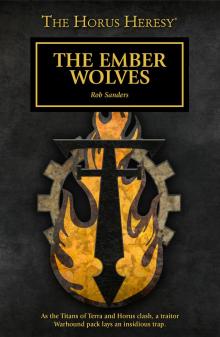 The Ember Wolves - Rob Sanders
The Ember Wolves - Rob Sanders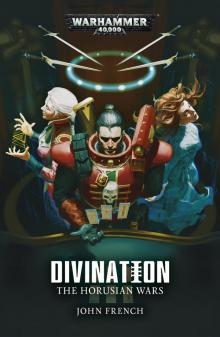 Divination - John French
Divination - John French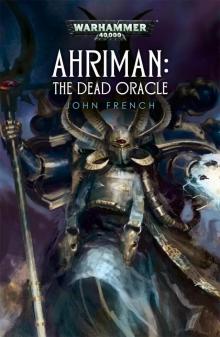 The Dead Oracle - John French
The Dead Oracle - John French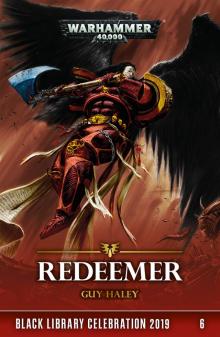 Redeemer - Guy Haley
Redeemer - Guy Haley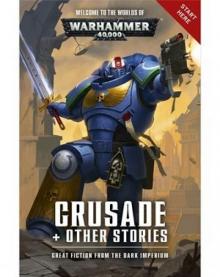 Crusade & Other Stories - Dan Abnett Et Al.
Crusade & Other Stories - Dan Abnett Et Al.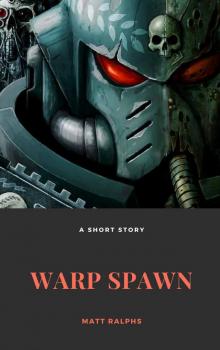 Warp Spawn - Matt Ralphs
Warp Spawn - Matt Ralphs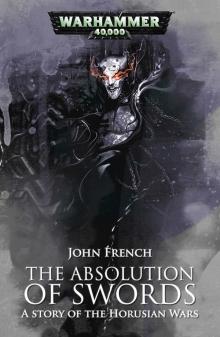 The Absolution of Swords - John French
The Absolution of Swords - John French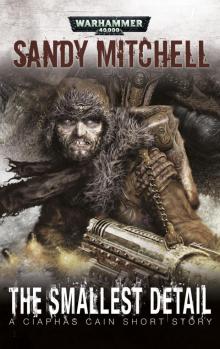 The Smallest Detail - Sandy Mitchell
The Smallest Detail - Sandy Mitchell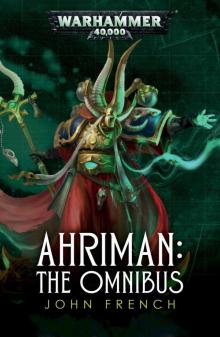 The Omnibus - John French
The Omnibus - John French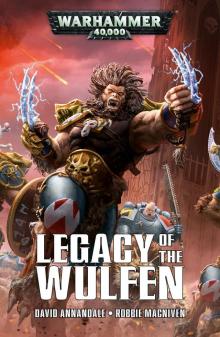 Legacy of the Wulfen - David Annandale & Robbie MacNiven
Legacy of the Wulfen - David Annandale & Robbie MacNiven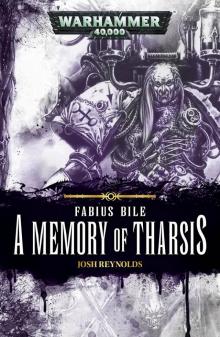 A Memory of Tharsis - Josh Reynolds
A Memory of Tharsis - Josh Reynolds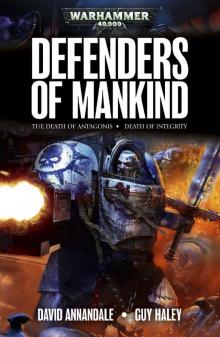 Defenders of Mankind - David Annandale & Guy Haley
Defenders of Mankind - David Annandale & Guy Haley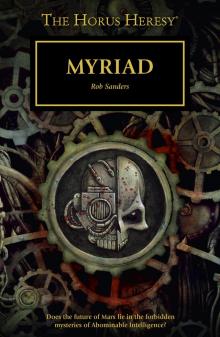 Myriad - Rob Sanders
Myriad - Rob Sanders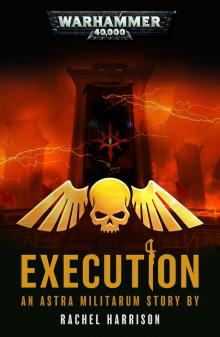 Execution - Rachel Harrison
Execution - Rachel Harrison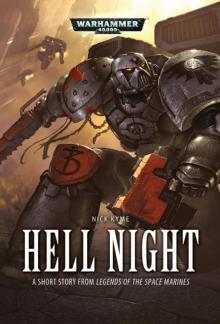 Hell Night - Nick Kyme
Hell Night - Nick Kyme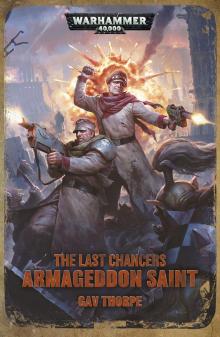 Armageddon Saint - Gav Thorpe
Armageddon Saint - Gav Thorpe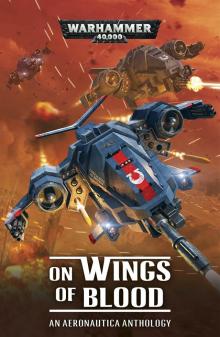 On Wings of Blood
On Wings of Blood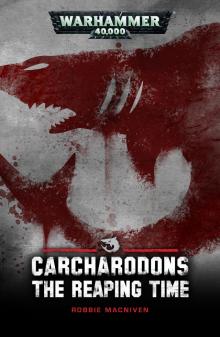 The Reaping Time - Robbie MacNiven
The Reaping Time - Robbie MacNiven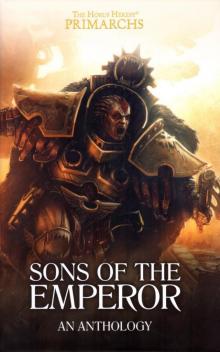 Sons of the Emperor
Sons of the Emperor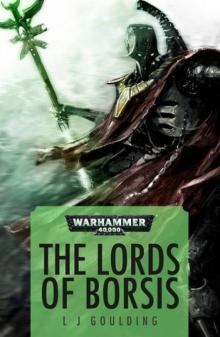 The Lords of Borsis - L J Goulding
The Lords of Borsis - L J Goulding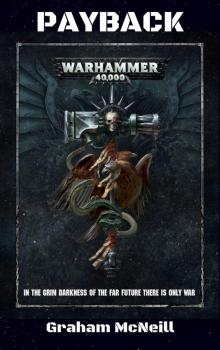 Payback - Graham McNeill
Payback - Graham McNeill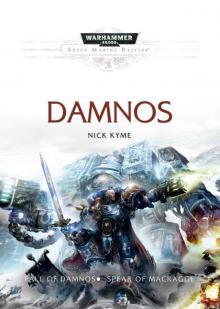 Damnos - Nick Kyme
Damnos - Nick Kyme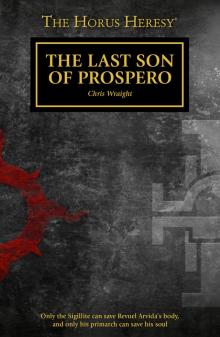 The Last Son of Prospero - Chris Wraight
The Last Son of Prospero - Chris Wraight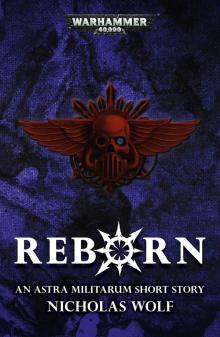 Reborn - Nicholas Wolf
Reborn - Nicholas Wolf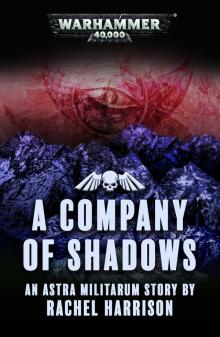 A Company of Shadows - Rachel Harrison
A Company of Shadows - Rachel Harrison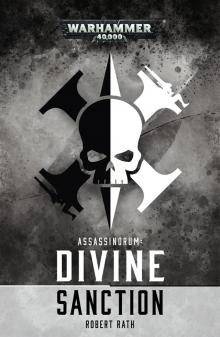 Assassinorum- Divine Sanction - Robert Rath
Assassinorum- Divine Sanction - Robert Rath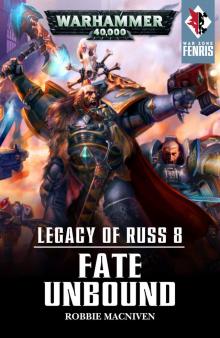 Fate Unbound - Robbie MacNiven
Fate Unbound - Robbie MacNiven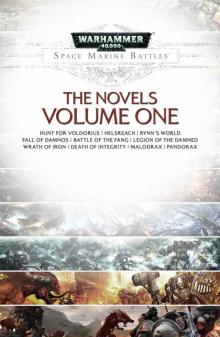 Space Marine Battles - the Novels Volume 1
Space Marine Battles - the Novels Volume 1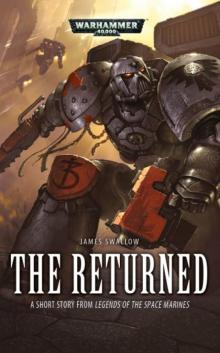 The Returned - James Swallow
The Returned - James Swallow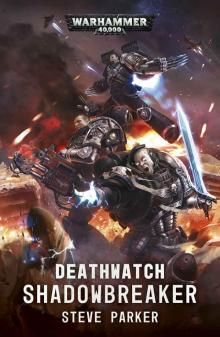 Shadowbreaker - Steve Parker
Shadowbreaker - Steve Parker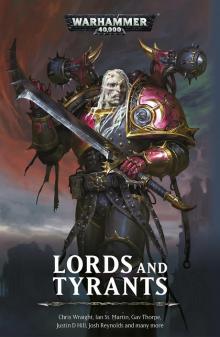 Lords and Tyrants
Lords and Tyrants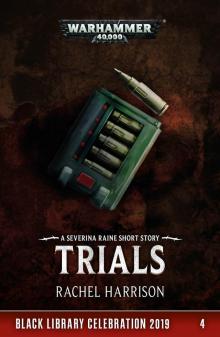 Trials - Rachel Harrison
Trials - Rachel Harrison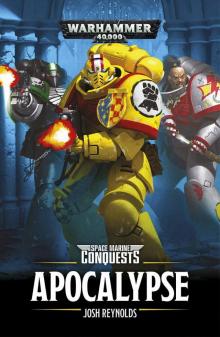 Apocalypse - Josh Reynolds
Apocalypse - Josh Reynolds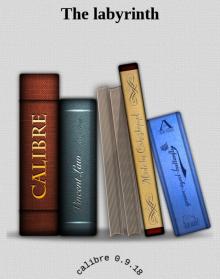 The labyrinth - Richard Ford
The labyrinth - Richard Ford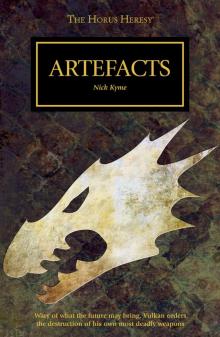 Artefacts - Nick Kyme
Artefacts - Nick Kyme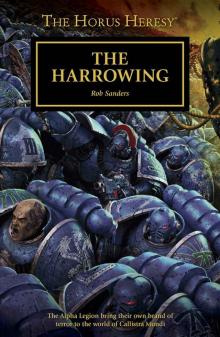 The Harrowing - Rob Sanders
The Harrowing - Rob Sanders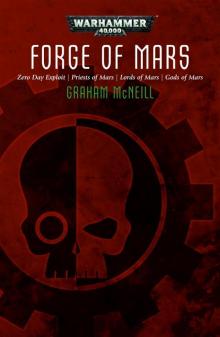 Forge of Mars - Graham McNeill
Forge of Mars - Graham McNeill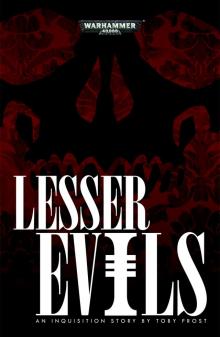 Lesser Evils - Toby Frost
Lesser Evils - Toby Frost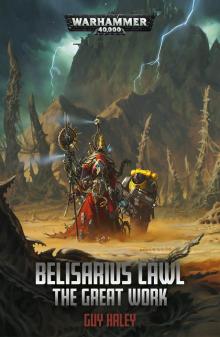 Belisarius Cawl- the Great Work - Guy Haley
Belisarius Cawl- the Great Work - Guy Haley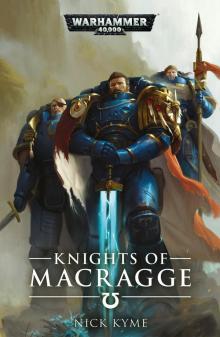 Knights of Macragge - Nick Kyme
Knights of Macragge - Nick Kyme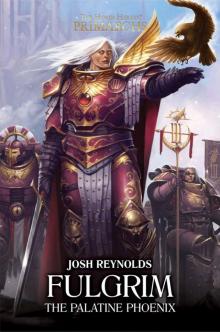 Fulgrim- The Palatine Phoenix - Josh Reynolds
Fulgrim- The Palatine Phoenix - Josh Reynolds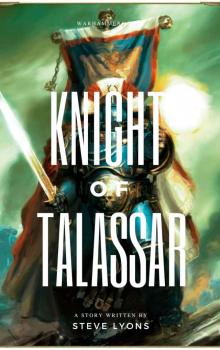 Knight of Talassar - Steve Lyons
Knight of Talassar - Steve Lyons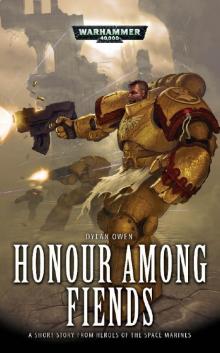 Honour Among Fiends - Dylan Owen
Honour Among Fiends - Dylan Owen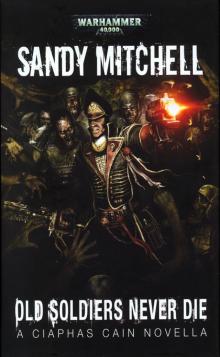 Old Soldiers Never Die - Sandy Mitchell
Old Soldiers Never Die - Sandy Mitchell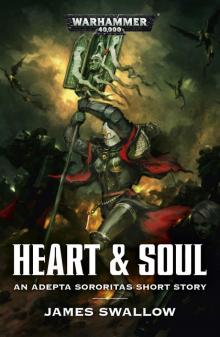 Heart & Soul - James Swallow
Heart & Soul - James Swallow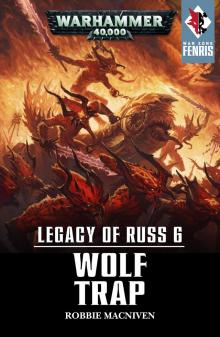 Wolf Trap - Robbie MacNiven
Wolf Trap - Robbie MacNiven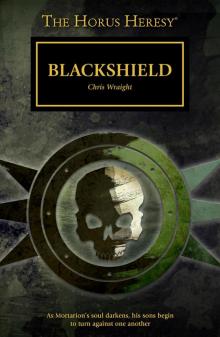 Blackshield - Chris Wraight
Blackshield - Chris Wraight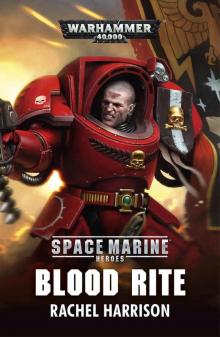 Blood Rite - Rachel Harrison
Blood Rite - Rachel Harrison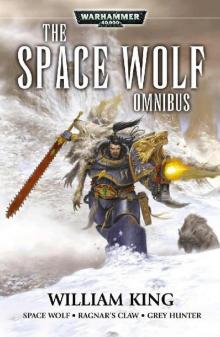 The Space Wolf Omnibus - William King
The Space Wolf Omnibus - William King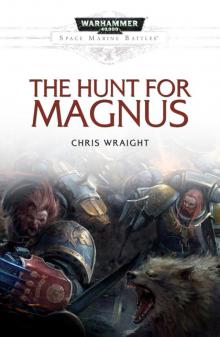 The Hunt for Magnus - Chris Wraight
The Hunt for Magnus - Chris Wraight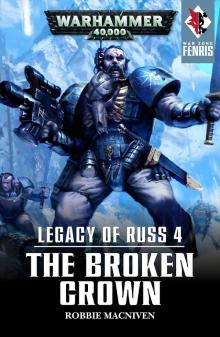 The Broken Crown - Robbie MacNiven
The Broken Crown - Robbie MacNiven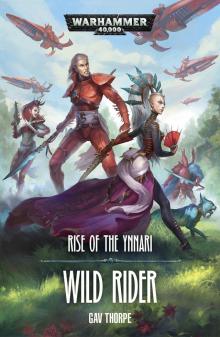 Wild Rider - Gav Thorpe
Wild Rider - Gav Thorpe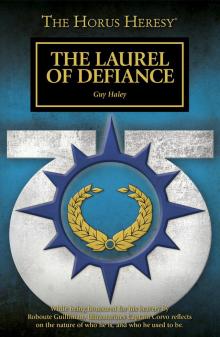 The Laurel of Defiance - Guy Haley
The Laurel of Defiance - Guy Haley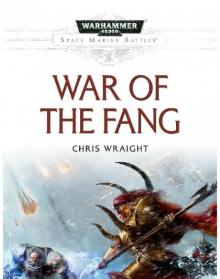 War of the Fang - Chris Wraight
War of the Fang - Chris Wraight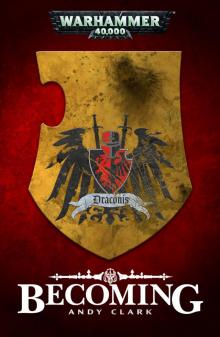 Becoming - Andy Clark
Becoming - Andy Clark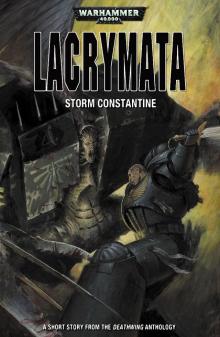 Lacrymata - Storm Constantine
Lacrymata - Storm Constantine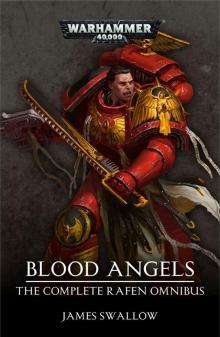 Blood Angels - The Complete Rafen Omnibus - James Swallow
Blood Angels - The Complete Rafen Omnibus - James Swallow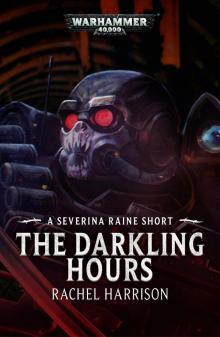 The Darkling Hours - Rachel Harrison
The Darkling Hours - Rachel Harrison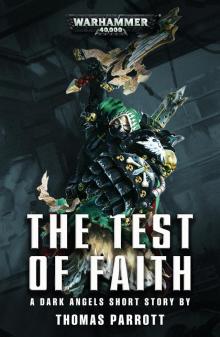 The Test of Faith - Thomas Parrott
The Test of Faith - Thomas Parrott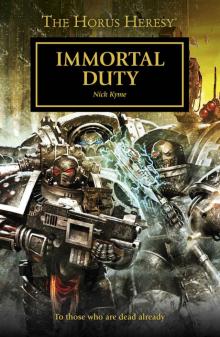 Immortal Duty - Nick Kyme
Immortal Duty - Nick Kyme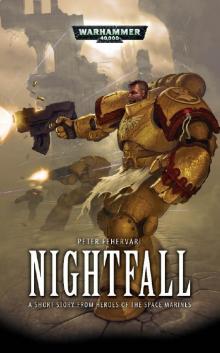 Nightfall - Peter Fehervari
Nightfall - Peter Fehervari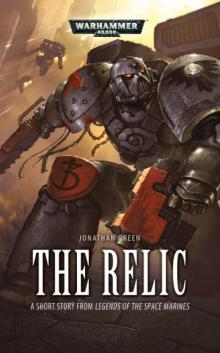 The Relic - Jonathan Green
The Relic - Jonathan Green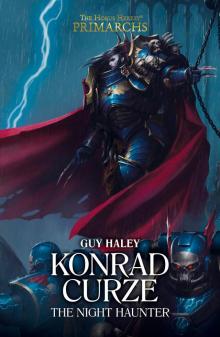 Konrad Curze the Night Haunter - Guy Haley
Konrad Curze the Night Haunter - Guy Haley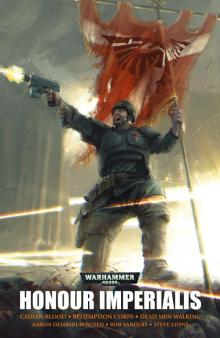 Honour Imperialis - Aaron Dembski-Bowden
Honour Imperialis - Aaron Dembski-Bowden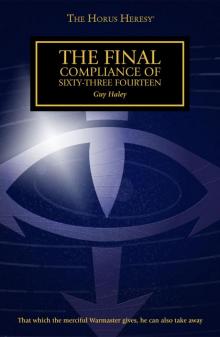 The Final Compliance of Sixty-Three Fourteen - Guy Haley
The Final Compliance of Sixty-Three Fourteen - Guy Haley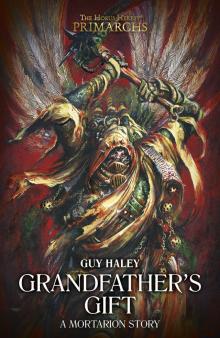 Grandfather’s Gift - Guy Haley
Grandfather’s Gift - Guy Haley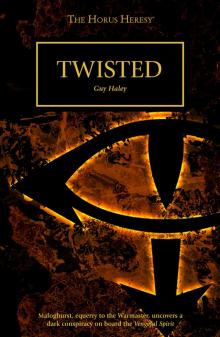 Twisted - Guy Haley
Twisted - Guy Haley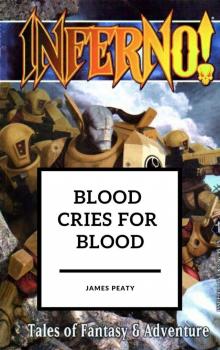 Blood Cries for Blood - James Peaty
Blood Cries for Blood - James Peaty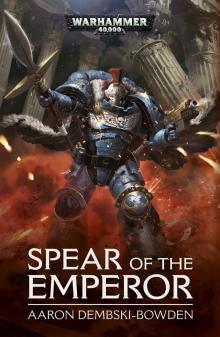 Spear of the Emperor - Aaron Dembski-Bowden
Spear of the Emperor - Aaron Dembski-Bowden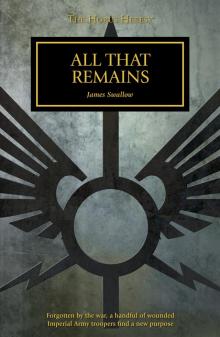 All That Remains - James Swallow
All That Remains - James Swallow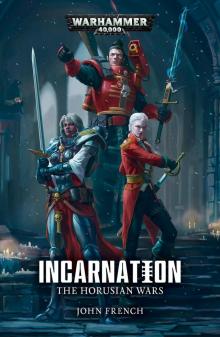 Incarnation - John French
Incarnation - John French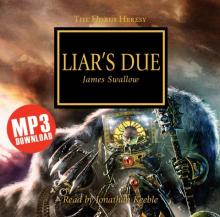 Liar's Due - Ben Swallow
Liar's Due - Ben Swallow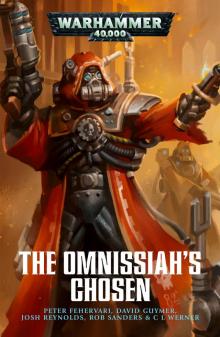 The Omnissiah's Chosen - Peter Fehervari
The Omnissiah's Chosen - Peter Fehervari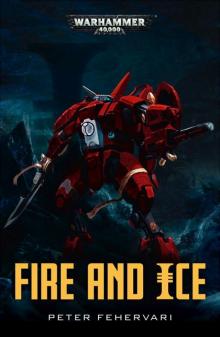 Fire and Ice - Peter Fehervari
Fire and Ice - Peter Fehervari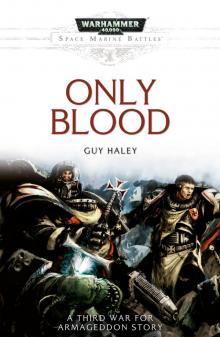 Only Blood - Guy Haley
Only Blood - Guy Haley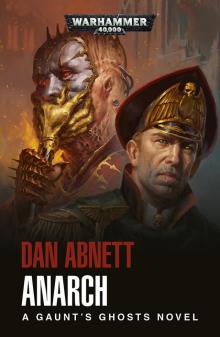 Anarch - Dan Abnett
Anarch - Dan Abnett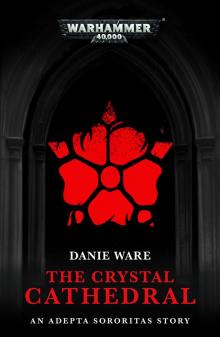 The Crystal Cathedral - Danie Ware
The Crystal Cathedral - Danie Ware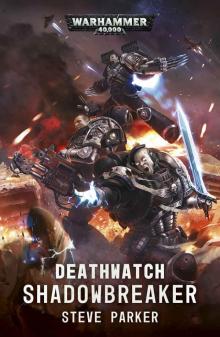 Shadowbreaker
Shadowbreaker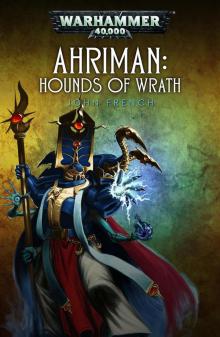 Hounds of Wrath - John French
Hounds of Wrath - John French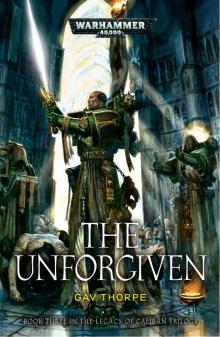 The Unforgiven - Gav Thorpe
The Unforgiven - Gav Thorpe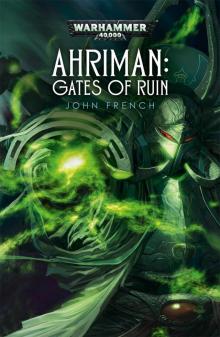 Gates of Ruin - John French
Gates of Ruin - John French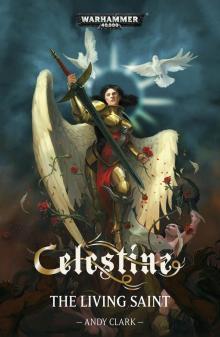 Celestine - Andy Clark
Celestine - Andy Clark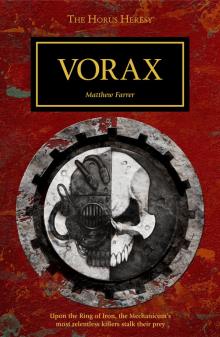 Vorax - Matthew Farrer
Vorax - Matthew Farrer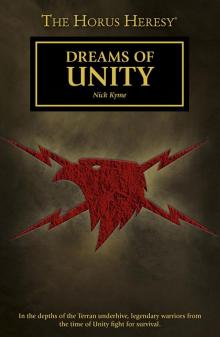 Dreams of Unity - Nick Kyme
Dreams of Unity - Nick Kyme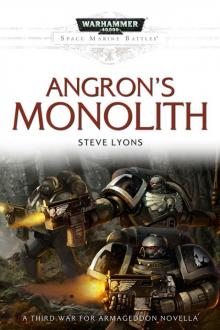 Angron's Monolith - Steve Lyons
Angron's Monolith - Steve Lyons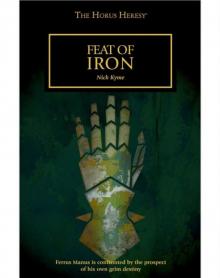 Feat of Iron - Nick Kyme
Feat of Iron - Nick Kyme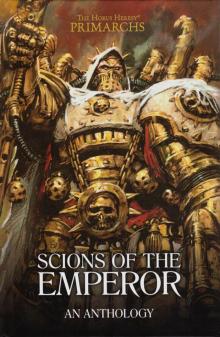 Scions of the Emperor
Scions of the Emperor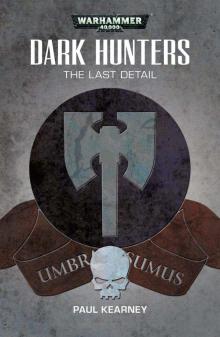 The Last Detail - Paul Kearney
The Last Detail - Paul Kearney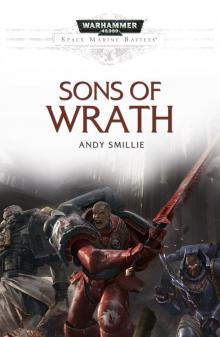 Sons of Wrath - Andy Smillie
Sons of Wrath - Andy Smillie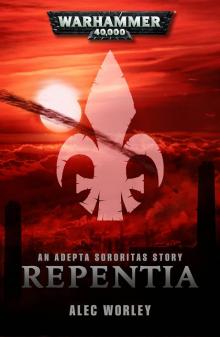 Repentia - Alec Worley
Repentia - Alec Worley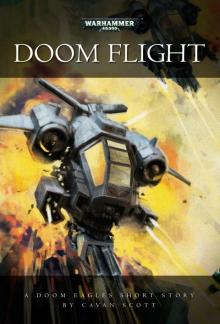 Doom Flight - Cavan Scott
Doom Flight - Cavan Scott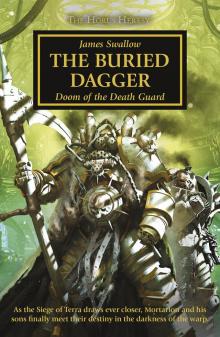 The Buried Dagger - James Swallow
The Buried Dagger - James Swallow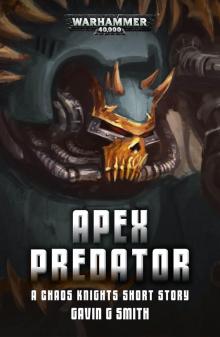 Apex Predator - Gavin G Smith
Apex Predator - Gavin G Smith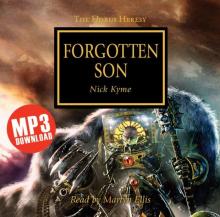 Forgotten Sons - Nick Kyme
Forgotten Sons - Nick Kyme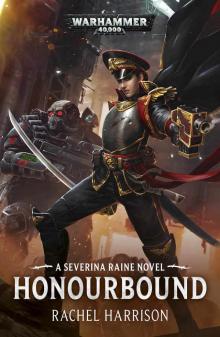 Honourbound - Rachel Harrison
Honourbound - Rachel Harrison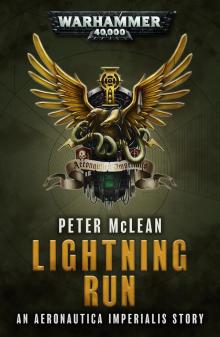 Lightning Run - Peter McLean
Lightning Run - Peter McLean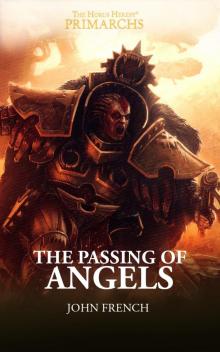 The Passing of Angels - John French
The Passing of Angels - John French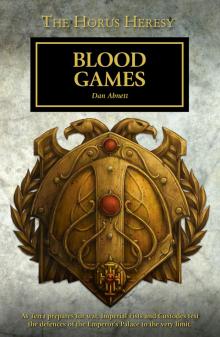 Blood Games - Dan Abnett
Blood Games - Dan Abnett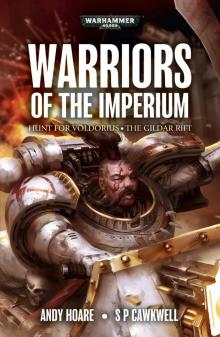 Warriors of the Imperium - Andy Hoare & S P Cawkwell
Warriors of the Imperium - Andy Hoare & S P Cawkwell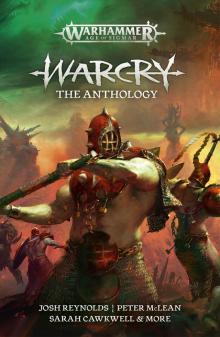 Warcry
Warcry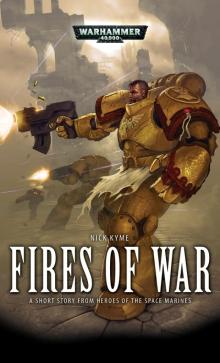 Fires of War - Nick Kyme
Fires of War - Nick Kyme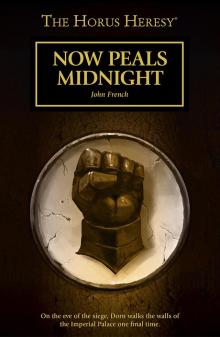 Now Peals Midnight - John French
Now Peals Midnight - John French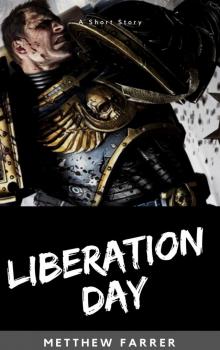 Liberation Day - Matthew Farrer
Liberation Day - Matthew Farrer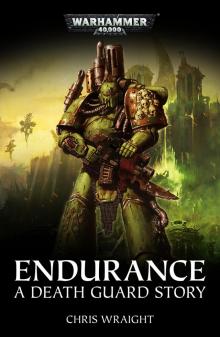 Endurance - Chris Wraight
Endurance - Chris Wraight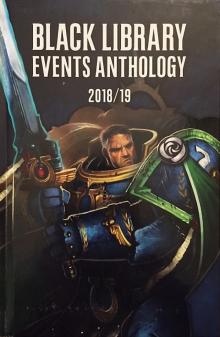 Black Library Events Anthology 2018-19
Black Library Events Anthology 2018-19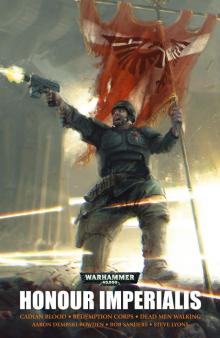 Honour Imperialis - Braden Campbell & Aaron Dembski-Bowden & Chris Dows & Steve Lyons & Rob Sanders
Honour Imperialis - Braden Campbell & Aaron Dembski-Bowden & Chris Dows & Steve Lyons & Rob Sanders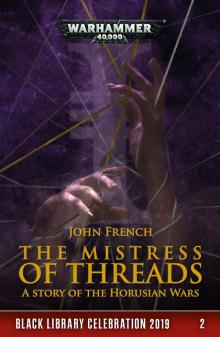 The Mistress of Threads - John French
The Mistress of Threads - John French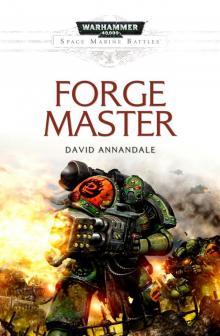 Forge Master - David Annandale
Forge Master - David Annandale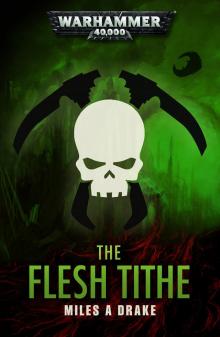 The Flesh Tithe - Miles A Drake
The Flesh Tithe - Miles A Drake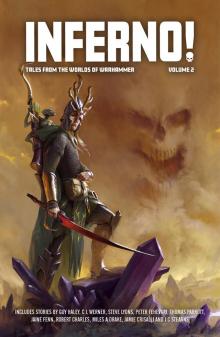 Inferno Volume 2 - Guy Haley
Inferno Volume 2 - Guy Haley Mercy of the Dragon - Nick Kyme
Mercy of the Dragon - Nick Kyme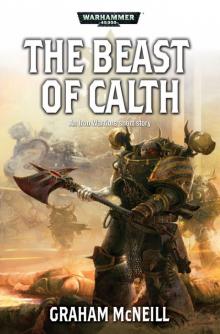 The Beast of Calth - Graham McNeill
The Beast of Calth - Graham McNeill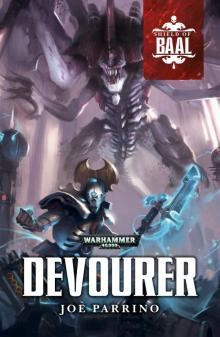 Devourer - Joe Parrino
Devourer - Joe Parrino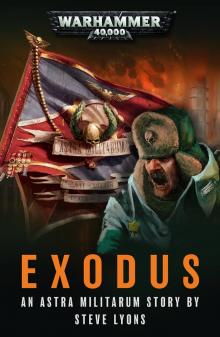 Exodus - Steve Lyons
Exodus - Steve Lyons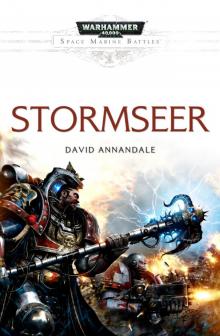 Stormseer - David Annandale
Stormseer - David Annandale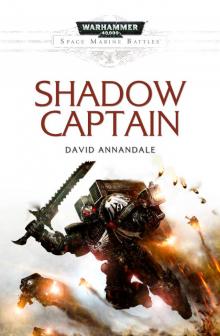 Shadow Captain - David Annandale
Shadow Captain - David Annandale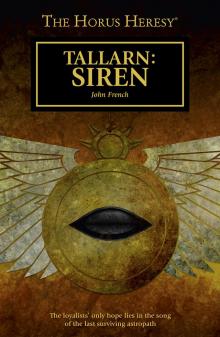 Tallarn- Siren - John French
Tallarn- Siren - John French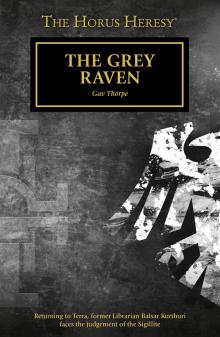 The Grey Raven - Gav Thorpe
The Grey Raven - Gav Thorpe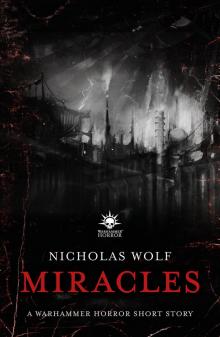 Miracles - Nicholas Wolf
Miracles - Nicholas Wolf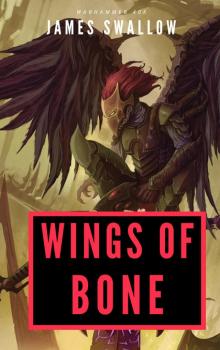 Wings of Bone - James Swallow
Wings of Bone - James Swallow